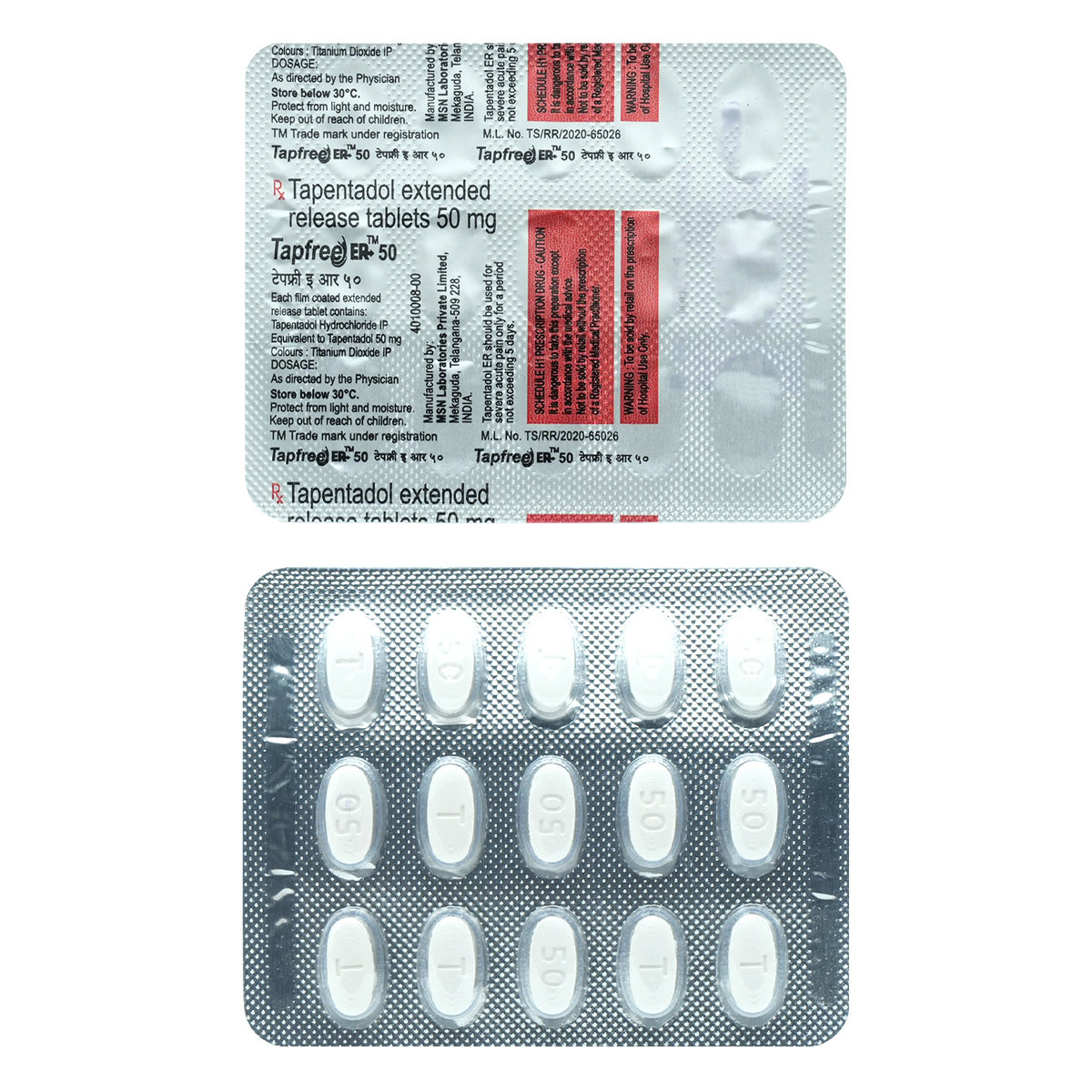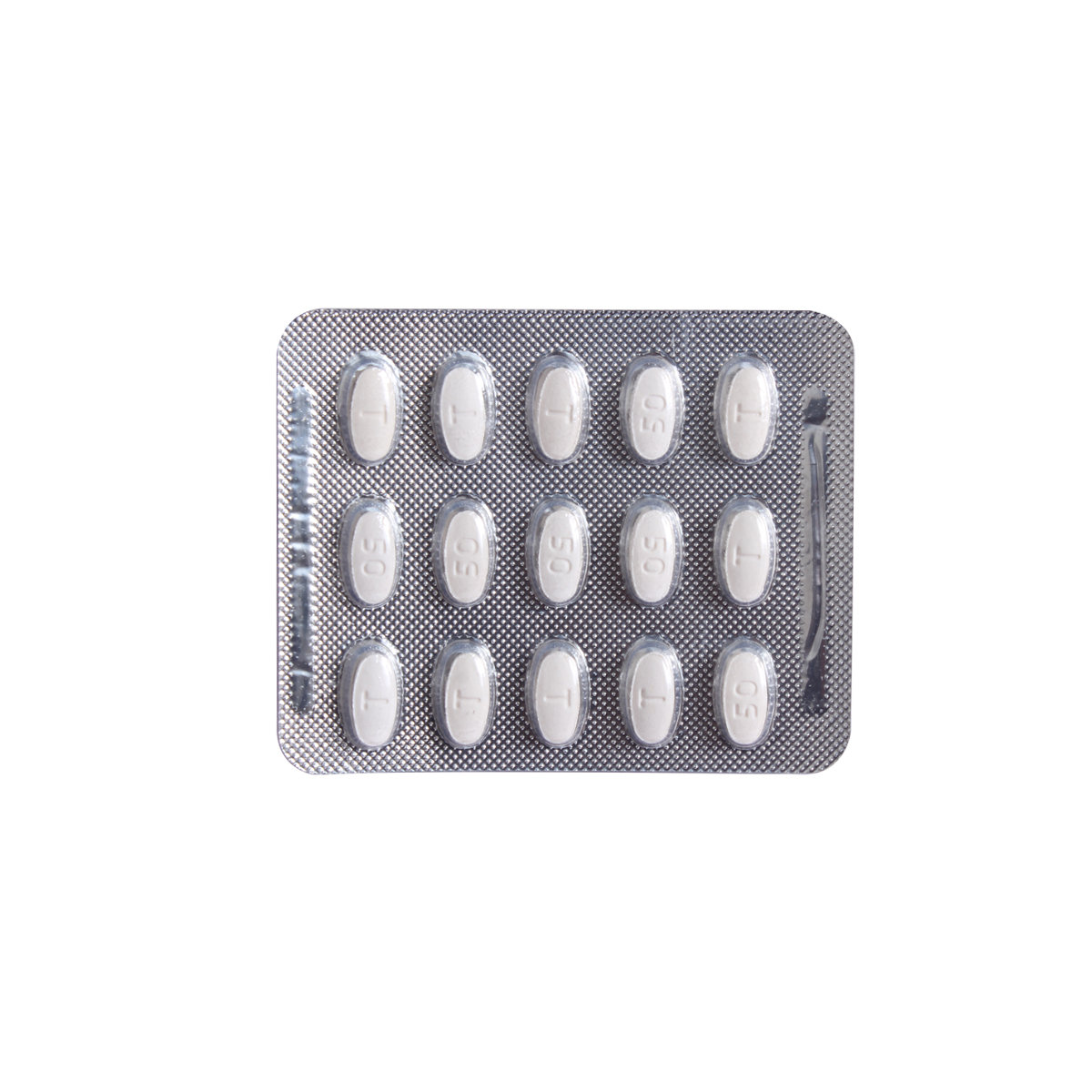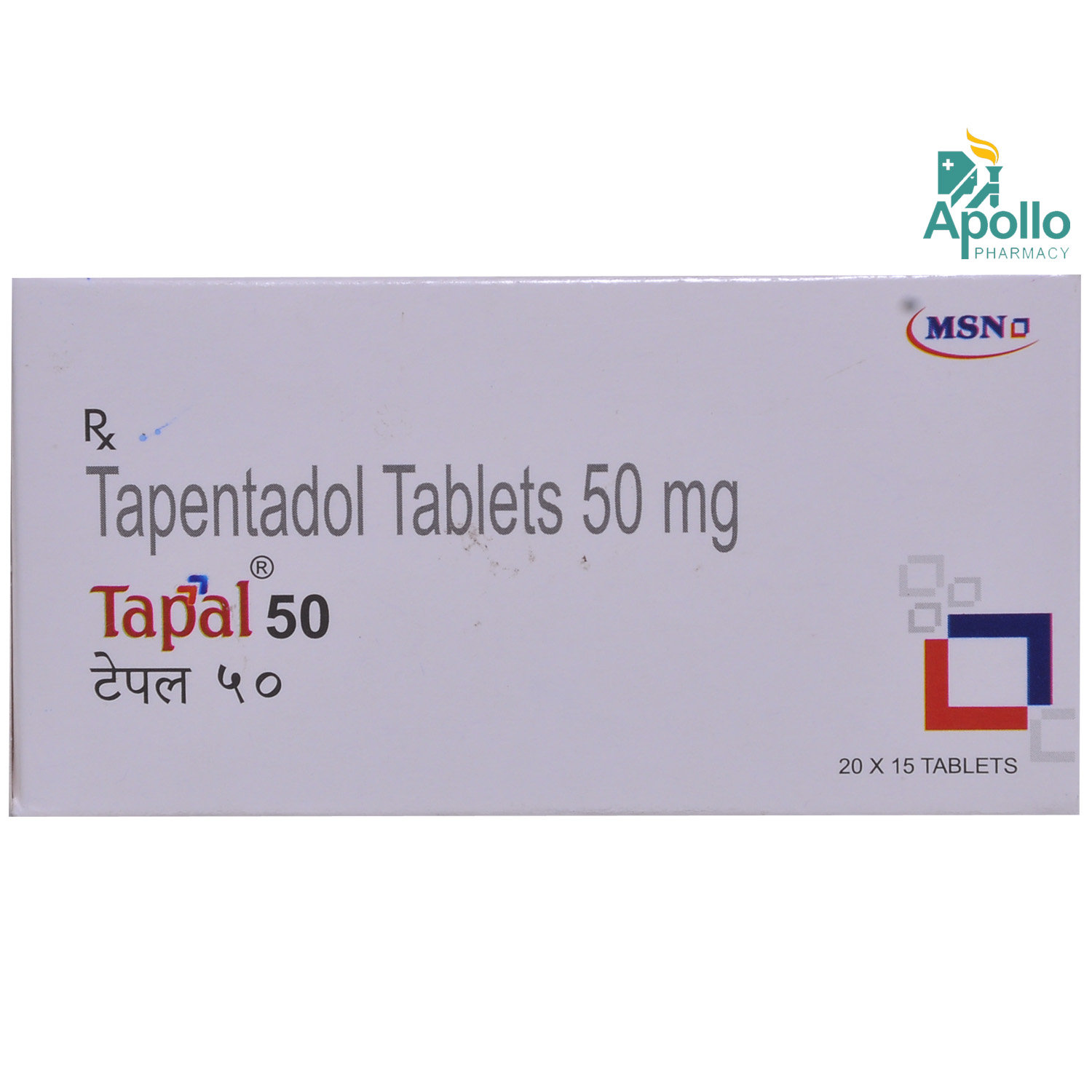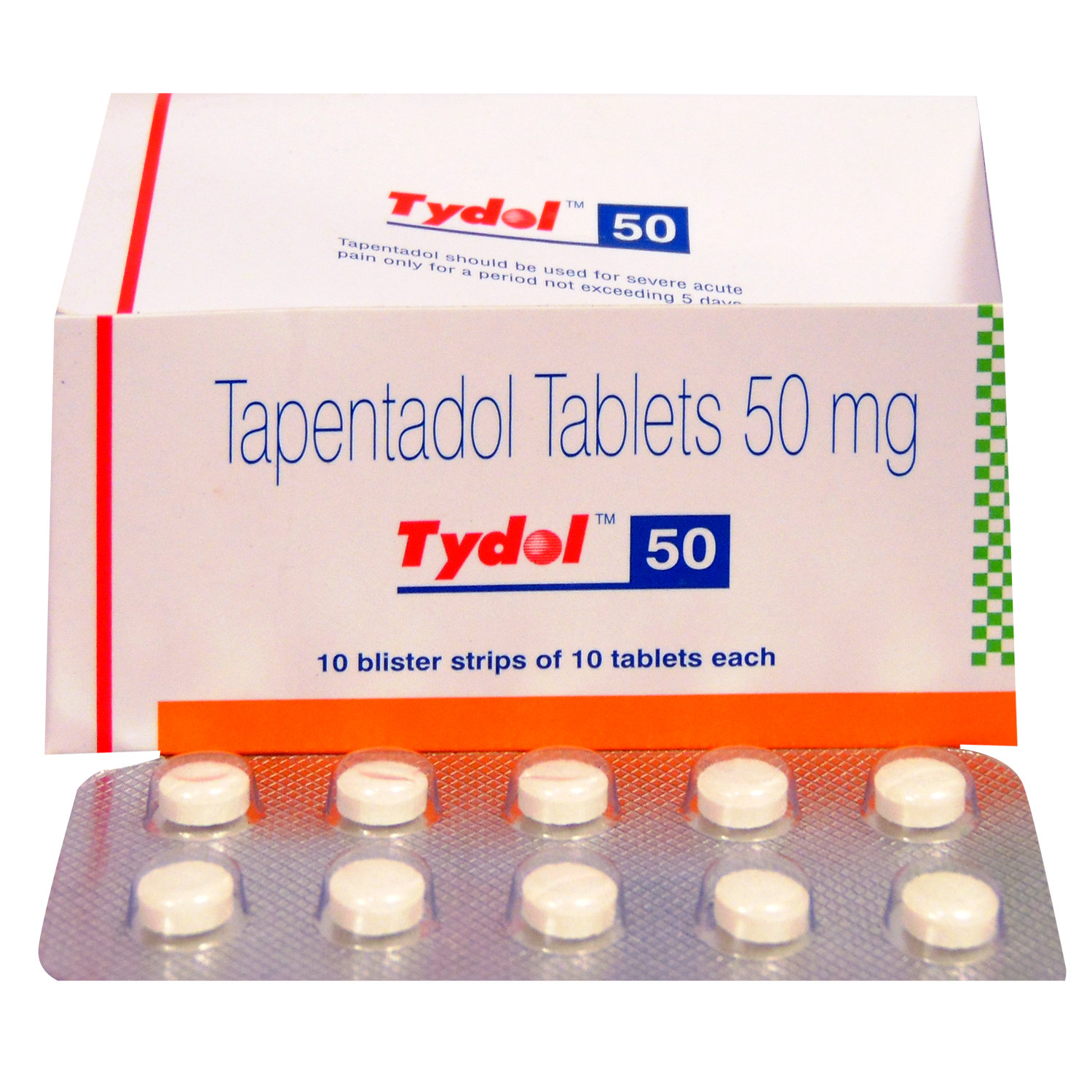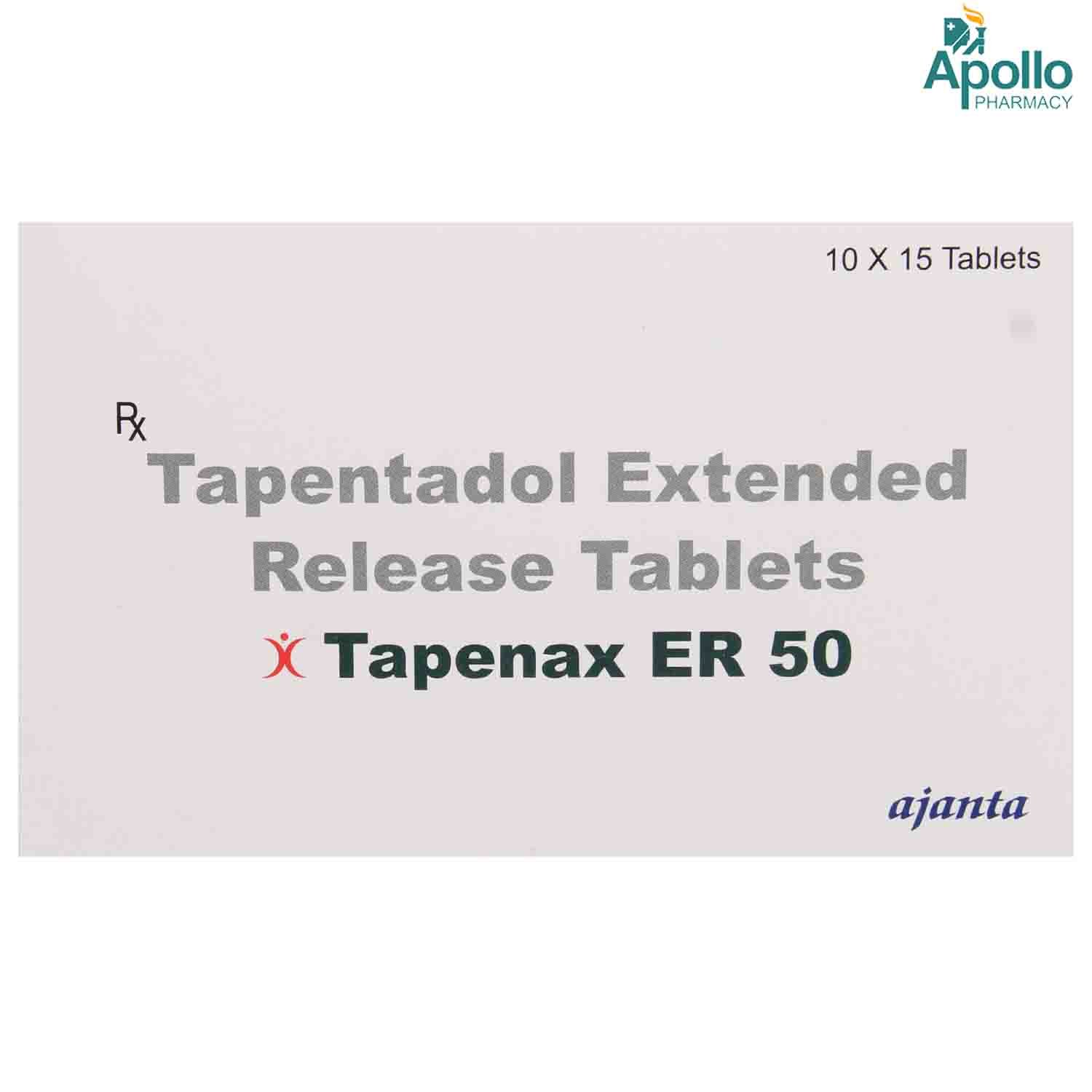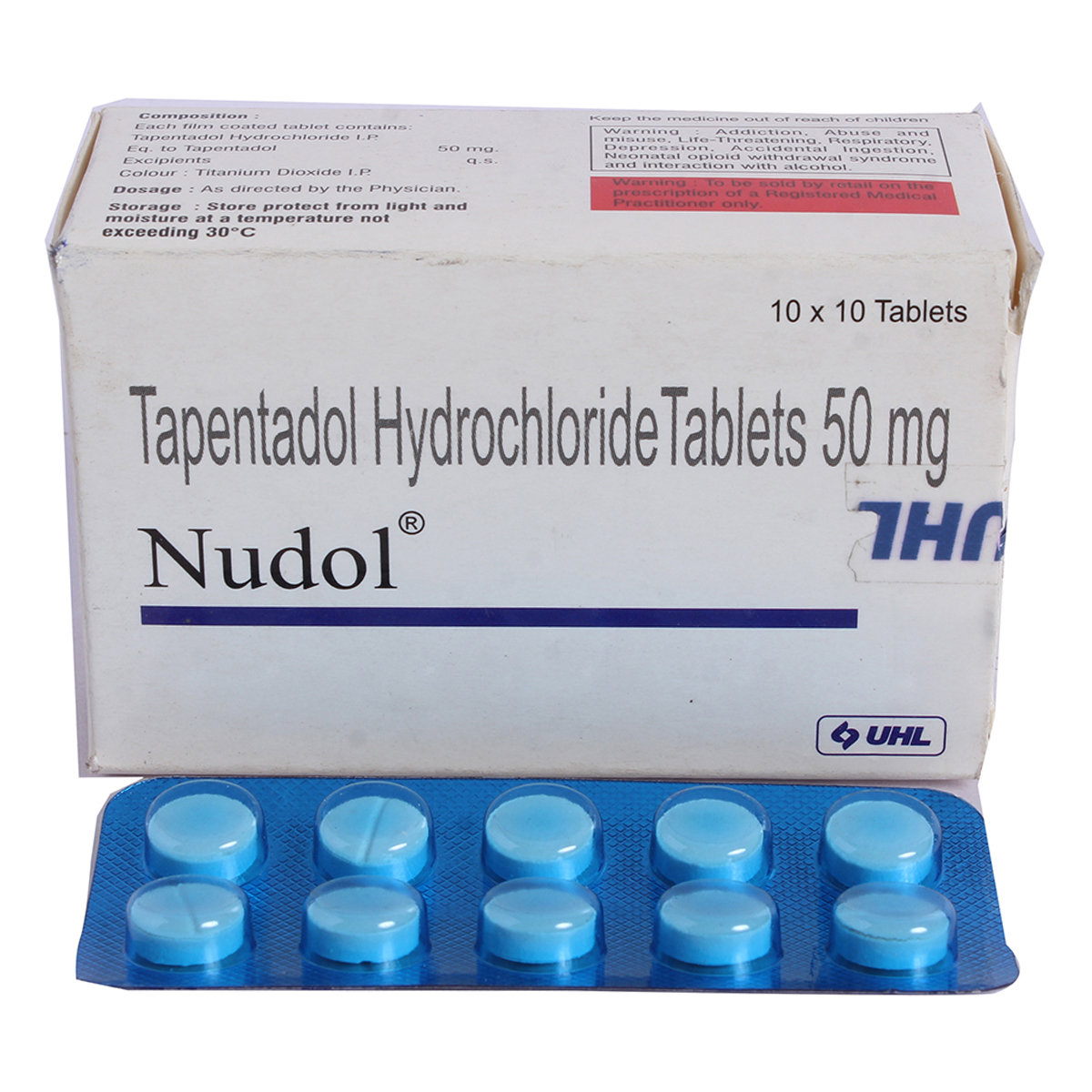Atcalm-50 Tablet 10's

₹159
(Inclusive of all Taxes)
₹23.9 Cashback (15%)
Atcalm-50 Tablet 10's is used to reduce moderate to severe pain. It contains Tapentadol, which reduces feelings of pain by interfering with the way neurons convey pain between the brain and the body. It may cause common side effects such as constipation, nausea, sleepiness, vomiting, tiredness, headache, dizziness, and abdominal pain. Before taking this medicine, you should tell your doctor if you are allergic to any of its components or if you are pregnant/breastfeeding, and about all the medications you are taking and pre-existing medical conditions.
Know Your Delivery Time
Provide Delivery Location
 Prescription drug
Prescription drugWhats That

Secure Payment

India's Most Trusted Pharmacy

Genuine Products
- Inform your doctor about the nausea and discuss possible alternatives to the medication or adjustments to the dosage.
- Divide your daily food intake into smaller, more frequent meals to reduce nausea.
- Opt for bland, easily digestible foods like crackers, toast, plain rice, bananas, and applesauce.
- Avoid certain foods that can trigger nausea, such as fatty, greasy, spicy, and smelly foods.
- Drink plenty of fluids, such as water, clear broth, or electrolyte-rich beverages like coconut water or sports drinks.
- Use ginger (tea, ale, or candies) to help relieve nausea.
- Get adequate rest and also avoid strenuous activities that can worsen nausea.
- Talk to your doctor about taking anti-nausea medication if your nausea is severe.
- Record when your nausea occurs, what triggers it, and what provides relief to help you identify patterns and manage your symptoms more effectively.
- Inform your doctor about dizziness symptoms. They may adjust your medication regimen or prescribe additional medications to manage symptoms.
- Follow your doctor's instructions for taking medication, and take it at the same time every day to minimize dizziness.
- When standing up, do so slowly and carefully to avoid sudden dizziness.
- Avoid making sudden movements, such as turning or bending quickly, which can exacerbate dizziness.
- Drink plenty of water throughout the day to stay hydrated and help alleviate dizziness symptoms.
- If you're feeling dizzy, sit or lie down and rest until the dizziness passes.
- Track when dizziness occurs and any factors that may trigger it, and share this information with your doctor to help manage symptoms.
- Avoid driving or operating machinery or activities that require high focus until you know how the medication affects you.
- Maintain a fixed sleeping schedule, create a relaxing bedtime routine and ensure your sleeping space is comfortable to maximize your sleep quality.
- Limit alcohol and caffeine as these may worsen drowsiness and disturb sleep patterns.
- Drink plenty of water as it helps with alertness and keeps you hydrated and for overall well-being.
- Moderate physical activity can improve energy levels, but avoid intense workouts right before bedtime.
- Hydrate your body: Drink enough water to prevent dehydration and headaches.
- Calm Your Mind: Deep breathing and meditation can help you relax and relieve stress.
- Rest and Recharge: Sleep for 7-8 hours to reduce headache triggers.
- Take rest: lie down in a quiet, dark environment.
- Cold or warm compresses can help reduce tension.
- Stay Upright: Maintain good posture to keep symptoms from getting worse.
- To treat headaches naturally, try acupuncture or massage therapy.
- Over-the-counter pain relievers include acetaminophen and ibuprofen.
- Prescription Assistance: Speak with your doctor about more substantial drug alternatives.
- Severe Headaches: Seek emergency medical assistance for sudden, severe headaches.
- Frequent Headaches: If you get reoccurring headaches, consult your doctor.
- Headaches with Symptoms: Seek medical attention if your headaches include fever, disorientation, or weakness.
- Report the itching to your doctor immediately; they may need to change your medication or dosage.
- Use a cool, damp cloth on the itchy area to help soothe and calm the skin, reducing itching and inflammation.
- Keep your skin hydrated and healthy with gentle, fragrance-free moisturizers.
- Try not to scratch, as this can worsen the itching and irritate your skin.
- If your doctor prescribes, you can take oral medications or apply topical creams or ointments to help relieve itching.
- Track your itching symptoms and follow your doctor's guidance to adjust your treatment plan if needed. If the itching persists, consult your doctor for further advice.
- Always wear loose-fitting clothes which are suitable for your activity.
- Include the diet containing fruits like watermelon, grapes, bananas and green leafy vegetables.
- Drink plenty of water stay hydrated.
- Avoid moving more and staying in hot sun.
- Preventing Vomiting (Before it Happens)
- Take medication exactly as prescribed by your doctor. This can help minimize side effects, including vomiting.
- Having a small meal before taking your medication can help reduce nausea and vomiting.
- Talk to your doctor about taking anti-nausea medication along with your prescribed medication.
- Managing Vomiting (If it Happens)
- Try taking ginger in the form of tea, ale, or candy to help alleviate nausea and vomiting.
- What to Do if Vomiting Persists
- Consult your doctor if vomiting continues or worsens, consult the doctor for guidance on adjusting your medication or additional treatment.
Drug-Drug Interactions
Drug-Drug Interactions
Login/Sign Up
Using Atcalm-50 Tablet together with Safinamide can increase the risk of high blood pressure and serotonin syndrome (A condition resulting from the accumulation of high levels of serotonin in the body. Serotonin is especially a mood stabilizer).
How to manage the interaction:
Although using Safinamide and Atcalm-50 Tablet together may cause an interaction, they can be taken if prescribed by a doctor. Consult a doctor if you have symptoms such as confusion, hallucination, fits, blood pressure alteration, increased heart rate, fever, excessive sweating, shivering or shaking, blurred vision, pain in the muscles or stiffness, incoordination, stomach cramps, nausea, vomiting, and loose stools. Inform a doctor if you have recently taken amitriptyline. Do not discontinue any medications without consulting a doctor.
Using Atcalm-50 Tablet together with Naltrexone can block the effects of Atcalm-50 Tablet, which reduces its ability to effectively treat your illness.
How to manage the interaction:
Taking Atcalm-50 Tablet with Naltrexone is generally avoided as it can possibly result in an interaction, it can be taken if your doctor has advised it. However, if you experience confusion, hallucination, seizure, extreme changes in blood pressure, increased heart rate, fever, excessive sweating, blurred vision, muscle spasm or stiffness, tremors, stomach cramps, nausea, vomiting, and diarrhoea call a doctor right away. Do not stop using any medications without a doctor’s advice.
Using Atcalm-50 Tablet together with Linezolid might raise serotonin hormone levels in the body, affecting the brain and nerve cells. Increased serotonin hormone can lead to severe side effects.
How to manage the interaction:
Taking Atcalm-50 Tablet with Linezolid is not recommended, consult a doctor before taking it. If you experience confusion, hallucination, seizure, extreme changes in blood pressure, increased heart rate, fever, excessive sweating, blurred vision, muscle spasm or stiffness, tremors, stomach cramps, nausea, vomiting, and diarrhea call a doctor right away. Do not stop using any medications without talking to a doctor.
Using Atcalm-50 Tablet together with Isocarboxazid can increase the risk or severity of side effects like decreased breathing rate, irregular heart rhythms, or problems with movement and memory.
How to manage the interaction:
Taking Isocarboxazid with Atcalm-50 Tablet is generally avoided as it can result in an interaction, it can be taken when advised by a doctor. If you experience confusion, hallucination, seizure, extreme changes in blood pressure, increased heart rate, fever, excessive sweating, blurred vision, muscle spasm or stiffness, tremors, stomach cramps, nausea, vomiting, and diarrhea call a doctor right away.
Using Atcalm-50 Tablet together with Rasagiline might raise serotonin hormone levels in the body, affecting the brain and nerve cells. Increased serotonin hormone can lead to severe side effects.
How to manage the interaction:
Taking Atcalm-50 Tablet with rasagiline is generally avoided, but can be taken only if prescribed by a doctor. However, if you experience confusion, hallucination, seizure, extreme changes in blood pressure, increased heart rate, fever, excessive sweating, blurred vision, muscle spasm or stiffness, tremors, stomach cramps, nausea, vomiting, and diarrhea call a doctor right away. Do not discontinue any medications without consulting a doctor.
Co-administration of Atcalm-50 Tablet together with Selegiline can increase the risk of serotonin syndrome (A condition resulting from the accumulation of high levels of serotonin in the body. Serotonin is a mood stabilizer).
How to manage the interaction:
Co-administration of Selegiline with Atcalm-50 Tablet is generally avoided as it can result in an interaction, but it can be taken if a doctor has advised it. If you experience confusion, hallucination, fits, extreme changes in blood pressure, increased heart rate, fever, excessive sweating, blurred vision, muscle spasm or stiffness, tremors, stomach cramps, nausea, vomiting, and diarrhea call a doctor. Do not discontinue any medications without consulting a doctor.
Co-administration of Atcalm-50 Tablet together with Clonazepam can increase the risk or severity of side effects like decreased breathing rate, irregular heart rhythms, or problems with movement and memory.
How to manage the interaction:
Taking Clonazepam with Atcalm-50 Tablet can result in an interaction, it can be taken if your doctor has advised it. Contact a doctor immediately if you experience signs such as drowsiness, lightheadedness, palpitations, confusion, severe weakness, or difficulty breathing. Do not discontinue any medications without consulting a doctor.
Taking Atcalm-50 Tablet with Milnacipran can enhance the effects of Milnacipran on the central nervous system.
How to manage the interaction:
Taking Milnacipran with Atcalm-50 Tablet can result in an interaction, it can be taken if your doctor has advised it. Contact a doctor immediately if you experience signs such as drowsiness, lightheadedness, palpitations, confusion, severe weakness, or difficulty breathing. Do not discontinue any medications without consulting a doctor.
Taking Atcalm-50 Tablet with Primidone can increase the risk or severity of side effects such as breathing problems.
How to manage the interaction:
Taking Primidone with Atcalm-50 Tablet can result in an interaction, it can be taken if your doctor has advised it. However, contact a doctor immediately if you experience dizziness, sleepiness, difficulty concentrating, and impairment in judgment. Do not discontinue any medications without consulting a doctor.
Using Zolpidem together with Atcalm-50 Tablet can cause central nervous system depression (a physiological state that can result in a decreased rate of breathing, decreased heart rate, and loss of consciousness).
How to manage the interaction:
Taking Zolpidem with Atcalm-50 Tablet can result in an interaction, it can be taken if a doctor has advised it. Contact a doctor immediately if you experience signs such as drowsiness, lightheadedness, palpitations, confusion, severe weakness, or difficulty breathing. You should refrain from using dangerous machinery or driving a car. Do not discontinue any medications without consulting a doctor.
Drug-Food Interactions
Drug-Food Interactions
Login/Sign Up
Product Substitutes

Have a query?
FAQs
Disclaimer
Author Details
We provide you with authentic, trustworthy and relevant information
Buy best C.n.s Drugs products by
Intas Pharmaceuticals Ltd
Sun Pharmaceutical Industries Ltd
Torrent Pharmaceuticals Ltd
Alkem Laboratories Ltd
Abbott India Ltd
Alteus Biogenics Pvt Ltd
Cipla Ltd
Micro Labs Ltd
Lupin Ltd
D D Pharmaceuticals Pvt Ltd
Ipca Laboratories Ltd
Tripada Healthcare Pvt Ltd
Arinna Lifesciences Ltd
Icon Life Sciences
Mankind Pharma Pvt Ltd
Linux Laboratories Pvt Ltd
East West Pharma India Pvt Ltd
Cnx Health Care Pvt Ltd
La Renon Healthcare Pvt Ltd
Talent India Pvt Ltd
Eris Life Sciences Ltd
Leeford Healthcare Ltd
Tas Med India Pvt Ltd
Emcure Pharmaceuticals Ltd
Macleods Pharmaceuticals Ltd
Consern Pharma Ltd
Zydus Healthcare Ltd
Troikaa Pharmaceuticals Ltd
Dr Reddy's Laboratories Ltd
Jagsam Pharma
Sigmund Promedica
Aristo Pharmaceuticals Pvt Ltd
Ardent Life Sciences Pvt Ltd
Zydus Cadila
Ikon Pharmaceuticals Pvt Ltd
Matias Healthcare Pvt Ltd
Shine Pharmaceuticals Ltd
Wockhardt Ltd
Theo Pharma Pvt Ltd
Propel Healthcare
Crescent Formulations Pvt Ltd
Lifecare Neuro Products Ltd
Reliance Formulation Pvt Ltd
Matteo Health Care Pvt Ltd
Mesmer Pharmaceuticals
Morepen Laboratories Ltd
Ajanta Pharma Ltd
Neon Laboratories Ltd
Capital Pharma
Med Manor Organics Pvt Ltd
Lyf Healthcare
Msn Laboratories Pvt Ltd
Sanix Formulation Pvt Ltd
Akumentis Healthcare Ltd
Pulse Pharmaceuticals
Brainwave Healthcare Pvt Ltd
Sanofi India Ltd
Solvate Laboratories Pvt Ltd
Cyrus Remedies Pvt Ltd
Elder Pharmaceuticals Ltd
Hetero Healthcare Pvt Ltd
Psyco Remedies Ltd
Medishri Healthcare Pvt Ltd
Alniche Life Sciences Pvt Ltd
Novartis India Ltd
Crescent Therapeutics Ltd
Hbc Life Sciences Pvt Ltd
Mova Pharmaceutical Pvt Ltd
Cadila Healthcare Ltd
Tripada Lifecare Pvt Ltd
Talin Remedies Pvt Ltd
Prevego Healthcare & Research Pvt Ltd
Serotonin Pharmaceuticals Llp
Solis Pharmaceuticals
Alembic Pharmaceuticals Ltd
Glenmark Pharmaceuticals Ltd
Infivis Life Care
Kivi Labs Ltd
Quince Lifesciences Pvt Ltd
Trion Pharma India Llp
Gagnant Healthcare Pvt Ltd
A N Pharmacia Laboratories Pvt Ltd
Primus Remedies Pvt Ltd
Crescent Pharmaceuticals
Glarizonto Pharma Pvt Ltd
Knoll Healthcare Pvt Ltd
Lia Life Sciences Pvt Ltd
Lyceum Life Sciences Pvt Ltd
Medopharm Pvt Ltd
Vasu Organics Pvt Ltd
Wallace Pharmaceuticals Pvt Ltd
Zuventus Healthcare Ltd
Arches Pharmaceuticals
Blue Cross Laboratories Pvt Ltd
Cadila Pharmaceuticals Ltd
Corona Remedies Pvt Ltd
Glial Life Science Llp
Lincoln Pharmaceuticals Ltd
Maneesh Pharmaceuticals Ltd
USV Pvt Ltd
Aareen Healthcare Pvt Ltd
Jenburkt Pharmaceuticals Ltd
Ozone Pharmaceuticals Ltd
Pfizer Ltd
Suraksha Pharma Pvt Ltd
Dycine Pharmaceuticals
Kuresys Labs Pvt Ltd
RPG Life Sciences Ltd
Sovyyn Pharmaceuticals
Apex Laboratories Pvt Ltd
FDC Ltd
Galaxus Pharmaceuticals
Gentech Healthcare Pvt Ltd
Gladstone Pharma India Pvt Ltd
Mano Pharma
Medley Pharmaceuticals Ltd
Overseas Health Care Pvt Ltd
Unimarck Healthcare Pvt Ltd
Walnut Life Sciences Pvt Ltd
Ikon Pharmachem
Madbris Lifesciences Pvt Ltd
Wings Pharmacuticals Pvt Ltd
Arbour Biotec Pvt Ltd
Divine Savior Pvt Ltd
Sbs Biotech
Strides Shasun Ltd
Adivis Pharma Pvt Ltd
Centaur Pharmaceuticals Pvt Ltd
Comed Chemicals Ltd
Hansh Pharmaceuticals
Kiosence Health Care Pvt Ltd
Mindwin Life Sciences Pvt Ltd
Oxpro Pharma Pvt Ltd
Startos Healthcare Pvt Ltd
Unichem International
Eysys Pharmaceutical Pvt Ltd
GlaxoSmithKline Pharmaceuticals Ltd
Health N U Therapeutics Pvt Ltd
LA Pharma
Lakarez Pharmaceuticals Pvt Ltd
Nicholas Piramal India Ltd
Olcare Laboratories Pvt Ltd
Systopic Laboratories Pvt Ltd
Unison Pharmaceuticals Pvt Ltd
Biochem Pharmaceutical Industries Ltd
Megma Healthcare Pvt Ltd
Salas Pharmaceuticals
Treatsure Pharma
Avis Lifecare Pvt Ltd
HEVEREN HEALTHCARE PVT LTD
Pills India Lifecare Solutions
Saanso Pharma Pvt Ltd
Septalyst Lifesciences Pvt Ltd
Solarium Pharmaceuticals
Starus Pharmaceuticals
Stature Life Sciences Pvt Ltd
Anglo French Drugs & Industries Ltd
Biozen Health Products Pvt Ltd
Geno Pharmaceuticals Pvt Ltd
Global Lifecare Pharma
Indoco Remedies Ltd
Myk Pharmaceuticals Ltd
OPINOR PHARMACEUTICALS PVT LTD
SMC HEALTHCARE PVT LTD
Chemo Healthcare Pvt Ltd
German Remedies Ltd
J B Chemicals & Pharmaceuticals Ltd
Pristine Pearl Pharma Pvt Ltd
Psychocare Health Pvt Ltd
Samarth Life Sciences Pvt Ltd
Sparsh Remedies Pvt Ltd
Glorior Biotech Pvt Ltd
Icarus Health Care Pvt Ltd
Meyer Organics Pvt Ltd
Obsurge Biotech Ltd
Ordain Health Care Global Pvt Ltd
Themis Pharmaceutical Ltd
Viltis Pharma Pvt Ltd
Arvincare
Auspharma Pvt Ltd
Johnson & Johnson Pvt Ltd
Snig Pharmaceuticals Pvt Ltd
Vrddhi Life Sciences
Yuventis Pharmaceuticals
Alathea Biotec Pvt Ltd
Alrafa Healthcare Pvt Ltd
Eisai Pharmaceuticals India Pvt Ltd
Helen Pharmaceuticals
Intra Life Pvt Ltd
Jagsonpal Pharmaceuticals Ltd
Johnlee Pharmaceuticals Pvt Ltd
Orsim Pharma
Tesla Labs
Torcium Biotech Pvt Ltd
Ucb India Pvt Ltd
Xender Biopharma & Research Llp
Biochemix Health Care Pvt Ltd
C'Estlavie Pharma
Cycus Healthcare Pvt Ltd
Humbing Ethicals
Knoll Pharmaceuticals Ltd
Laborate Pharmaceuticals India Ltd
Medgen Drugs And Laboratories Pvt Ltd
Meglife Pharmaceuticals Pvt Ltd
Themis Medicare Ltd
Wanbury Ltd
Alienist Pharmaceutical Pvt Ltd
Alna Biotech Pvt Ltd
Dr Bird Pharmaceuticals Opc Pvt Ltd
Rhine Biogenics Pvt Ltd
Solas Healthcare
URENUS PHARMACEUTICALS PVT LTD
Unipark Biotech Pvt Ltd
Winmark Healthcare Pvt Ltd
Zee Laboratories Ltd
Adonis Laboratories Pvt Ltd
Albert David Ltd
Anax Life Sciences Pvt Ltd
Arrient Healthcare Pvt Ltd
Canviko Healthcare Pvt Ltd
Delcure Life Sciences Ltd
Dhamus Pharma
Ishjas Pharma Pvt Ltd
Mitis Biomedics Ltd
Regenix Drugs Ltd
Ronyd Healthcare Pvt Ltd
Skn Organics Pvt Ltd
Steris Healthcare
Unichem Laboratories Ltd
Vanprom Lifesciences Pvt Ltd
Walton Health Care Pvt Ltd
Alarta Pharmaceuticals
Cognyzon Pharmaceuticals
Dolvis Bio Pharma Pvt Ltd
Elbrit Life Sciences Pvt Ltd
Ernst Pharmacia
Healing Pharma
Ideal Life Sciences Pvt Ltd
Lloyd Healthcare Pvt Ltd
Pharma Fabrikon
Ranbaxy Laboratories Ltd
Seagull Pharmaceutical Pvt Ltd
Silver Cross Medisciences Pvt Ltd
Unimarck Pharma India Ltd
Zenolia Life Science Pvt Ltd
An Pharmaceuticals Pvt Ltd
Bion Therapeutics (I) Pvt Ltd
East India Pharmaceutical Works Ltd
Kepler Healthcare Pvt Ltd
Larion Life Sciences Pvt Ltd
Lotus Life Sciences
Nexkem Pharmaceuticals Pvt Ltd
Psychotropics India Ltd
Race Pharmaceuticals Pvt Ltd
Saffron Therapeutics Pvt Ltd
Serum Institute Of India Pvt Ltd
Silok Pharmaceuticals
Siskan Pharma Pvt Ltd
3M India Ltd
Arkson Pharmaceuticals
Aurz Pharmaceutical Pvt Ltd
Auxesis Pharmaceuticals Pvt Ltd
Ficus Life Sciences Pvt Ltd
Force India Pharma
Geneaid Pharmaceuticals
HEALTHITUDE LIFESCIENCES PVT LTD
Helios Pharmaceuticals
Hetero Drugs Ltd
Kriven Health Solutions Pvt Ltd
Levin Life Sciences Pvt Ltd
Neurolife Pharmaceuticals Pvt Ltd
Pharmed Ltd
Q Check Pharmaceuticals
ROARMED PHARMACEUTICALS PVT LTD
Recoupe Pharma
Signova Pharma
Systemic Healthcare
Torque Pharmaceuticals Pvt Ltd
United Cure Biosciences Pvt Ltd
Win Medicare Ltd
Zodiacal Pharmaceuticals Pvt Ltd
Aar Ess Remedies Pvt Ltd
Alvris Life Science Pvt Ltd
Apellon Biotech
Arztin Pharma
Aspen Pharmaceutical Pvt Ltd
Delvin Formulations (P) Ltd
Erikson Pharma
Galpha Laboratories Ltd
Hauz Pharma Pvt Ltd
Human Biolife India Pvt Ltd
Hymax Healthcare Pvt Ltd
Innovative Pharmaceuticals Pvt Ltd
Invision Medi Sciences Pvt Ltd
Kinesis Pharmaceuticals Pvt Ltd
Macway Biotech Pvt Ltd
Mascot Health Series Pvt Ltd
Maverick Pharma Pvt Ltd
Medsol India Overseas Pvt Ltd
Medtas Healthcare












